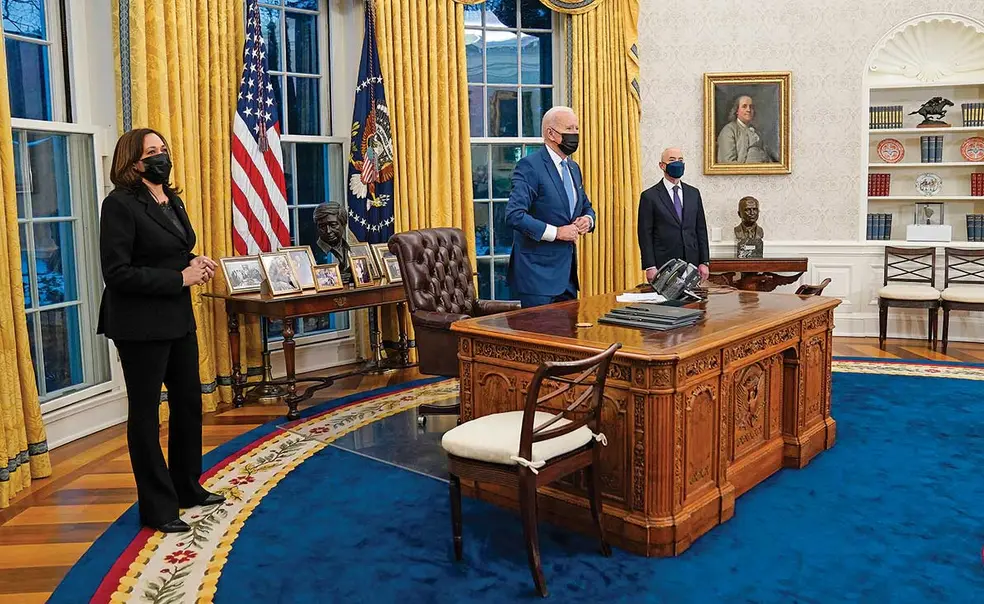Keeping an Eye on Biden Administration’s Higher Ed Policies
Immigration policy is just one national issue that could affect the University’s work and mission
When the University decided to send students home last year because of the COVID-19 pandemic, international students faced an additional dilemma unrelated to the overwhelming health concerns. Should students rush home before the borders closed? And if students did leave, would they be able to return?
“The pandemic presented another level of difficulty on top of an already-challenging environment,” Albert Rivera, the director of the Davis International Center, said in an email to PAW.
In recent years, international students at the University have faced uncertainty regarding the stability of their visa status while studying in the United States and in securing work after graduation. That uncertainty grew during the four years of President Donald Trump’s administration, which was marked by sweeping changes to immigration policy and a national political environment that Rivera said “could reasonably be interpreted” as not being welcoming.
“Among the most difficult conversations over the past few years [were those that] involved telling students they should not travel home out of real concern for their ability to return,” Rivera said. “Or, advising a student their loved ones might not be able to secure a visa for Commencement given the travel ban in effect.”
Rivera said it’s too soon to make generalizations just a few months into the administration of President Joe Biden, but he senses optimism on campus that immigration policies in the U.S. are headed in a more welcoming direction.
“We are pleased that the Biden administration’s early executive orders were designed to ensure that decisions are made using the best available science and data … .” — Lynn Loo, professor of chemical and biological engineering and director of the Andlinger Center for Energy and the Environment
Immigration policy is just one national issue that could affect the University’s work and mission after the change in leadership in the executive branch.
Joyce Rechtschaffen ’75, who lobbies the government for policies that benefit the University and higher education more generally as director of the University’s Office of Government Affairs, said her goals are the same, regardless of the administration. “Of course, how you partner and what different positions administrations take may affect the job and may affect my ability to advance those goals,” she added.
Rechtschaffen said that “without a doubt,” the hardest part of her job lobbying the Trump administration over the last four years “was the attack on the ability of universities to attract and retain international students.” She noted that the new administration has already issued executive orders “on things that were very fundamental to this University”: removing a travel ban on predominantly Muslim countries and strengthening DACA protections.
Other important issues Rechtschaffen said are on her plate as she lobbies the new administration include making college more accessible to students from low- and middle-income families and promoting research opportunities.
While many policies can change from one administration to the next, the relative continuity of Congress can help minimize some shifts. For example, Rechtschaffen noted that though the Trump administration cut funding for research in proposed budgets to Congress, legislators have a history of supporting research on a bipartisan basis.
That support is crucial for Princeton. Professor Lynn Loo, the director of the Andlinger Center for Energy and the Environment, said in an email to PAW that the majority of the center’s research has been federally funded. The new administration’s prioritization of climate change may also align with the center’s goals.
“We are pleased that the Biden administration’s early executive orders were designed to ensure that decisions are made using the best available science and data, and that scientific integrity is emphasized at all agencies,” Loo said. “The combination of these shifts in perspectives offers real-world opportunity for the research from our faculty and researchers to serve as the basis for meaningful change.”
Changes that were made to University policies in recent years to comply with directives from the Trump administration could also soon be dialed back, particularly when it comes to sexual-misconduct policies on campus.
Last year, the U.S. Department of Education announced new Title IX rules that changed the definition of sexual harassment, narrowed the kinds of complaints schools could consider, and required the opportunity to cross-examine witnesses during hearings. The University responded last summer by implementing two sexual-misconduct policies to comply with federal regulations while maintaining aspects of the University’s previous policy.
Those policies could soon change, though. In early March, Biden issued an executive order requiring the Department of Education to review and reconsider Title IX guidelines.
“The University will look forward to receiving additional information and guidance from the Department of Education in the coming months,” said Vice Provost Michele Minter, the University’s Title IX coordinator, “and we will continue to engage and seek input from the University community on these important issues.”
While the University and its lobbying office keep an eye on Biden’s agenda and actively campaign for certain policies, their concerns aren’t solely focused on benefitting the University.
“It’s not necessarily Princeton-specific things — although there are certainly Princeton-specific things that affect us in some ways — but also the interests of higher education,” said Rechtschaffen, noting that her D.C.-based team shares office space with Rutgers’ lobbying team and they often work with the Association of American Universities. “We very rarely go in just as Princeton University.”












No responses yet